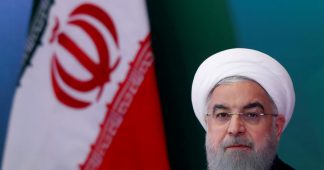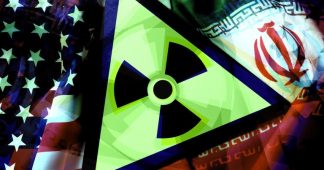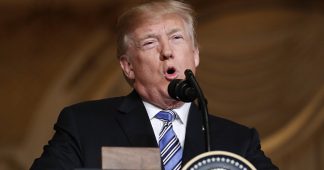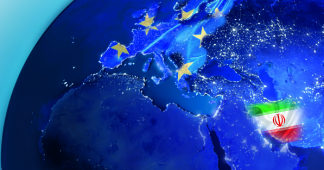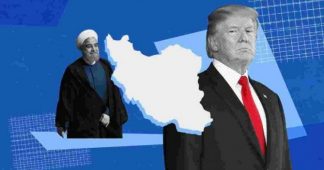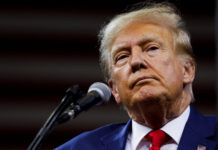By8 July 2019
There is at present a risk for a full-scale US military onslaught on Iran. It makes the media and the public forget that another US onslaught has already been carried out – on the authority of the Security Council and the United Nations Charter. Both media and governments routinely state that the US has “withdrawn” from the “agreement” on the Iranian nuclear energy programme, the Joint Comprehensive Plan of Action (JCPOA). This is misleading. The US “withdrew” from the Paris agreement on climate change, in accordance with a clause that expressly allowed for its withdrawal. This was regretted by the whole world, but it was nonetheless legal. However, China, France, Germany, Russia, the UK, US and Iran did not sign an “agreement” containing a withdrawal clause. They did not sign any document at all. Rather, after some ten years of negotiations, they came up with a joint detailed plan of action envisaging an important scaling-down and strong International Atomic Energy Agency (IAEA) inspection of Iran’s nuclear programme and the lifting of economic sanctions against Iran.
Needless to say, seven members of the United Nations could not lift sanctions decided upon by the UN Security Council, binding on all UN members, alone. What they could do – and did – was to place their plan before the Security Council for consideration, endorsement and decisions that would be binding on all UN members, including themselves. The mandatory provisions on the lifting of UN sanctions are like a law. They contain no lines that allow anybody to “withdraw”, but commends elaborate procedures for the handling of complaints. The US government made no use of these procedures but re-imposed extensive sanctions unilaterally. In other words, they did not “withdraw” from an agreement; they violated a Security Council decision that was legally binding. Not only that, they urged all other UN members to join them in violating the decision they were obliged to respect (under rule 25 of the UN Charter), and made it clear they were ready to use their own financial system to punish enterprises which did business with Iran, relying on the Security Council’s decision and the JCPOA to lift sanctions. What we have witnessed is, in effect, Washington purporting to replace the United Nations Security Council. And what is the world’s reaction?
Against the background of Russia’s actions in Ukraine, there has been much talk in Europe and the US about the need to respect the “rules-based international order”, including, undoubtedly, the UN Charter. The US government, one of the chief architects of this order, is now evidently directly engaged in undermining it. Most governments – including those of China, Russia and the European Union – have found this shocking, and have not joined the re-imposition of illegally introduced sanctions. A financial mechanism created by European governments shows their good will to protect continued trade with Iran, however, such is the US’ power in global finance, this is largely unable to protect private enterprises that wishes to continue business with Iran but dare not for fear of US economic punishment.
European and other governments have pleaded diplomatically with the US to change course, but this has been in vain. They have also turned to Iran, urging consideration of possible concessions to the US, and to imploring them to continue to respect fully the Security Council-mandated JCPOA, despite its deprivation of intended benefits. Indeed, some European governments appear to be threatening Iran with re-imposition of sanctions if Iran is to depart in the slightest – for instance by exceeding the stipulated maximum stored quantity of 300 kg low enriched uranium – from the JCPOA, which the US has already almost totally wrecked.
It is true that Iran has no practical need to exceed the set limits, but one may wonder how meaningful such a threat is when, in practical terms, sanctions have already been re-imposed on enterprises in Europe by US action. Adding a grim irony to US “realpolitik” is Washington’s insistence that Security Council sanctions imposed on North Korea should be firmly implemented by all. One would like to understand the real (rather than various stated reasons) why the US government has chosen to cripple Iran through illegal sanctions, and why, as in the case of Iraq in 2002 and 2003, it is amassing military forces ready to strike. What is this pressure intending to attain?
As in the case of Iraq, the US alleges that Iran may intend to develop nuclear weapons and that the JCPOA is an unsatisfactory bar. While one cannot exclude the possibility that one day a threatened Iran could use its nuclear energy competence and infrastructure to embark on a weapons programme, to date Iran has fully complied with the plan of action for scaling down its nuclear energy programme and has fully accepted highly intrusive IAEA control. Even the Israeli military does not seem to have been in favour of military action against the current Iranian nuclear programme. As in the case of Iraq, the US may be advancing alleged nuclear concerns because the public is inclined to approve of actions against the further spread of nuclear weapons.
Is Iran, as alleged by the US, then a threat to US or international security, and one that the US feels it must stop? It is true that the outcome of the civil war in Syria is rather positive for Iran and negative for the US and its friends, and that Iranian allies are doing well in Yemen, but this hardly makes Iran a country bent on frontal military actions against its neighbours. Rather, with Israel, Saudi Arabia and the UAE armed to their teeth and the US keeping a huge US naval base in Bahrein; a huge air base in Qatar; two aircraft carriers in the Gulf; and US ground forces in Iraq, it is Iran under active threat of attack from the air. However, attacks to destroy Iranian nuclear installations could be problematic in view of public international reactions and possible retaliation by Iran against nuclear power plants in Abu Dhabi. Attacks on military, industrial and infrastructure would hardly lead to a subdued Iran, but rather would risk developing into a major conflagration at a time when President Trump may not want to see the US electorate distracted by another Middle-East war.
Is the US so concerned about human rights and lack of democracy in Iran? So imbued by memories of the occupation of the US embassy in 1980 that it is impelled to threaten military action to topple the regime? Not likely. Many of us in the West are not enamoured by an authoritarian regime that is one of the most energetic users of the death penalty. But it is hard to believe that human rights concerns would be a compelling reason for the US to threaten or take armed action. After all, the US cultivates close cooperation with Saudi Arabia, a state that has even used a consulate as a site for one of its many executions.
President Trump has repeatedly come out and suggested that Iran call him to deflate the situation, solve all differences, and allow him to help Iran build a brilliant future – even without regime change. If he were sincere – and there is no reason to think he is – the posture he seems willing to present is one of a benevolent emperor of all-powerful America offering the ruler of a distant minor realm to come before him, to explain what problems there are and to await the directions of the mighty. Perhaps his real intention is to enable himself to claim, in a crisis, that he had offered generous conciliation and that his olive branch was rejected.
Unlike some of his advisors, President Trump probably does not want an armed conflict. Nor might Saudi Arabia, the UAE and Israel be eager for an unpredictable war and regime change in Iran. It would be understandable if they worried about Iran expanding economic power and influence rather than the state’s military power, and if this speculation is right, their primary ambition might be to hold back Iran’s economic development for as long as possible. In such a scenario, concessions or acts of conciliation by Iran would not defuse the current situation. Tension may be the very thing desired as rationale for sanctions, leading to poor economic development rather than any specific political changes. In a more optimistic scenario, however, perhaps some acts of conciliation by Iran could enable Washington to declare victory and return to the rules-based international system.
Published at https://www.europeanleadershipnetwork.org/commentary/a-rules-based-or-us-based-international-order-for-iran/
